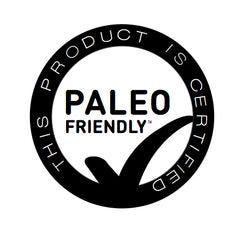Should there be a Paleo certification label?


Last weekend I discovered the merits of Paleo eating. To be honest, it was only a matter of time before I drank the saber-toothed Kool-Aid. Paleo is rapidly becoming the lifestyle of choice for many who seek improved energy, fitness and health, as evidenced by the new crop of Paleo-angled media, such as Paleo Magazine and a podcast titled “Latest in Paleo.”
Perhaps my decision was spurred by a weekend camping in the Rockies, or that my bellwether of a friend preached Paleo values for the duration of a daylong hike (his winning persuasion: “Join your Paleolithic brethren, Jenna.”), but I finally internalized the eating plan that lauds ultra-unprocessed foods: no to sugar, grains and dairy; yes to vegetables, nuts and seeds and fruits. And obviously, yes to meat. My housemates are on board too, which explains the sudden appearance of bison steaks and knobby Paleo muffins in my kitchen.
By no means do I plan to follow Paleo strictly. If my proclivity for cheese strikes, I’ll certainly indulge. Plus, I’m vegetarian, which immediately banishes me from the Stone Age set who install meat freezers in their apartments. But “Paleo lites” are growing privy to the benefits of the lifestyle.
Natural products companies are jumping on the bandwagon too, as they’re starting to market products specifically to primal shoppers. For example, Boulder-based Zest Brands, makers of almond flour cookies and cakes, boldly proclaims their products fit the Paleo lifestyle with a woolly mammoth logo reading “Paleo Perfect.” Likewise, Paleo Bread by Julian Bakery, made predominantly with coconut flour, psyllium seed powder, and apple cider vinegar, would send a true caveman scampering out of his, um, cave.
New companies are also cropping up at tradeshows—many of which showcase Paleo-friendly ingredients such as Epic Bar, The New Primal, Caveman Cookies, and a recent favorite, Primal Pit Paste (a.k.a. natural deodorant).
Can you certify a caveman?

As expected in a world of special-diet neologisms (flexitarian, pescatarian), certification labels have emerged to bolster (capitalize on?) the Paleo trend. For instance, Paleo Friendly: Developed by The Paleo Foundation, the label aims to assure Paleo followers that a product adheres to diet specifications (“Grain-free, legume-free, dairy-free, artificial coloring, artificial preservatives, artificial sweeteners and artificial flavor enhancers-free,” according their website). It’s certainly a tool to bridge the gap between a 10,000-year-old hunter-gatherer and a time-strapped modern cubicle jockey.
But those who follow a clean-eating diet may take offense from Paleo labels on packaged foods. “By eating foods mass-manufactured and wrapped in plastic, I can't help but feel that I’m deviating from the essence of the lifestyle—to eat whole, simple foods that our ancient ancestors would have eaten,” explains my Paleo-enthused housemate. “It’s hard to ignore the obvious marketing attempts with such products and start wondering if these are really healthy choices for our bodies, or just for someone else's wallet.”
Indeed, on one level, certification labels don’t address shopper intelligence. If I really wanted to follow a strict Paleo diet, I could buy only unpackaged foods: lettuce, eggs, red peppers, beef, etc; or scrutinize ingredient labels—admittedly an exhaustive task, given the grain- and dairy-saturated grocery aisles.
But there are some great Paleo products on the market that are truly healthy, delicious, and difficult or time-consuming to make in a home kitchen. Plus, as with gluten-free contamination issues, wouldn’t it be great to instantly know if a product was Paleo approved?
What do you think? Should Paleo have a specific certification label? Share in the comments below.
About the Author(s)
You May Also Like




